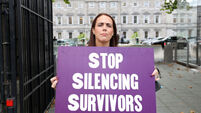Clodagh Finn: Don’t just ask for Angela, demand action on abuse

The emergence of a market in glass covers to stop someone popping a date-rape drug into your drink is a stark indicator as to how weary women feel at night.
The initiative aims to encourage anyone who feels unsafe in a social situation to discreetly seek help by going to the bar and asking for Angela. Then, all going to plan, trained staff will help them make an exit.















